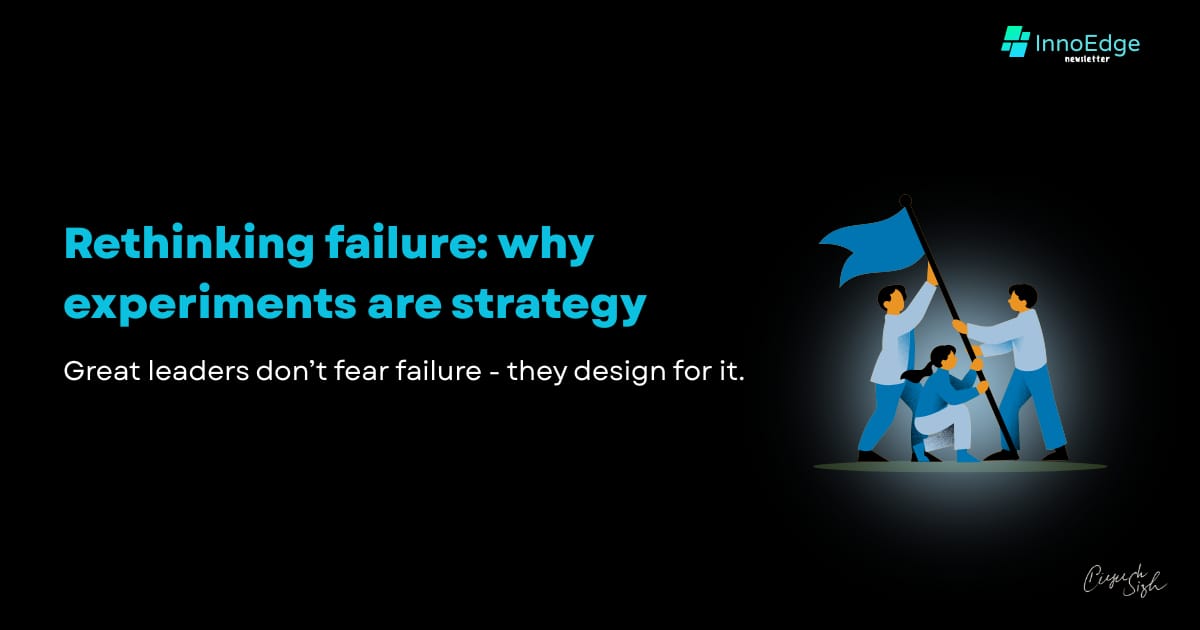
“The only way to win is to learn faster than anyone else.” ~ Eric Ries
Most leaders celebrate success stories. But the truly great ones? They celebrate experiments - even the ones that fail.
Because strategy isn’t born from certainty. It’s born from curiosity, iteration, and the courage to test what others only plan.
Let’s talk about it in 2 minutes 👇
🔥Today’s Spotlight
Rethinking failure

🔮The leadership moment
When Amazon launched the Fire Phone in 2014, it was a massive flop - costing the company millions.
But instead of hiding it, Jeff Bezos called it a “necessary experiment.”
Why? Because the lessons from that failure directly shaped Alexa and Echo - two of Amazon’s biggest long-term wins.
The Fire Phone wasn’t a failure, it was data.
That’s what innovative leaders understand: progress doesn’t come from avoiding mistakes, but from learning faster than everyone else.
🧠Why it works
Research from Harvard Business School found that companies that run more small, controlled experiments outperform peers by up to 30% in innovation outcomes.
It’s called the “portfolio of experiments” approach — testing many small bets, learning quickly, and scaling what works.
In neuroscience, this mindset activates your brain’s “exploratory mode,” fostering curiosity and resilience - both key traits of adaptive leaders.
🤺Practice the principle
Try this today-
The 1-3-1 Experiment Rule:
When facing a challenge:
1️⃣ Identify 1 assumption you’re making. What belief are you relying on that may or may not be true?
2️⃣ Design 3 small experiments to test it. Keep them low-risk, fast, and measurable.
3️⃣ Reflect on 1 key learning - whether it worked or not. Document what surprised you or confirmed your thinking.
This simple shift turns uncertainty into insight. Instead of fearing mistakes, you will build a structured way to learn faster than anyone else.
✨ Pro tip:
Repeat this regularly with different assumptions in your team or personal projects. Over time, you’ll create a culture of experimentation where bold ideas are tested quickly, and every “failure” fuels smarter decisions.
🧭 Key takeaway for leaders
Don’t just ask, “What if this fails?”
Ask, “What might we learn if it does?”
Encourage small, controlled risks to unlock insights.
Treat assumptions as experiments, not certainties.
Celebrate lessons, not just wins.
Strategic leaders don’t wait for perfect answers - they learn their way forward, one experiment at a time.
What’s one “failed” project you’ve had that might actually have been an experiment in disguise?
#Leadership #Innovation #Strategy #Experimentation #GrowthMindset
♻️If this resonated with you, share it with someone who leads with thought, not impulse.
And that’s a wrap for today!
Thank you for reading. See you in the next edition!
I'd love you to join me on this journey! Everyday, I share my thoughts on how to stay ahead with timeless strategies and fresh insights for leaders. I cut through the noise and get straight to the knowledge that matters in just 2 mins.
📧Click here to subscribe.


